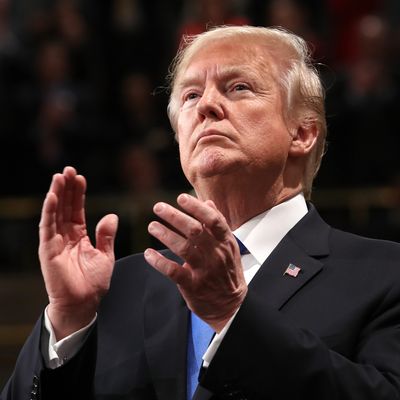
Donald Trump is a racist demagogue who launched his career in right-wing politics on the charge that the first black president wasn’t truly American — and his presidential campaign on the claim that Mexican immigrants were predominately criminals, drug dealers, and rapists.
He is also a president of the United States. And, more specifically, a president who desperately needs to expand his base of support, and has few better opportunities to do so than in a nationally televised speech to Congress. These two realities produced the defining tension of Trump’s first State of the Union address: It was a speech that attempted to articulate a more racially and ideologically inclusive version of Trumpism, while also making the case that immigrants are bringing crime and drugs to the United States — and that our nation’s future and security depends on keeping “them” out.
Trump began his remarks by promising to make America great again for “all Americans,” putting every ounce of emphasis he could muster on that “all” bit. He proceeded to express his distinct pleasure at the fact that “African-American unemployment stands at the lowest rate ever recorded,” and that the same was true for Hispanic-Americans. (Given Trump’s diatribes against the ingratitude of African-American athletes, it is hard not to hear this line as an attempt to ridicule criticisms of his administration’s racial politics and policies.)
Trump then endorsed a series of vague, but nonetheless bipartisan — if not outright Democratic — policy proposals, including reducing drug prices, infrastructure investment, subsidized job training, and paid family leave. Most remarkably, the president vowed to reform America’s prisons and give ex-convicts better opportunities to reintegrate into society, because “as America regains its strength, this opportunity must be extended to all citizens.”
Immediately after that line, Trump directed attention to the parents of two teenage girls who were murdered by MS-13 gang members. He did not highlight their suffering as part of a proposal to combat gang violence or increase funding for law enforcement, but rather as a means of painting homicidal gang members as typical of the kinds of immigrants who are entering the United States through “chain migration” and the diversity visa lottery.
Trump described the latter as “a program that randomly hands out green cards without any regard for skill, merit, or the safety of our people” — an utterly fraudulent claim that ignores the fact that recipients of diversity visas still have to comply with all the standard requirements of U.S. immigration law. Among other things, this means that they must demonstrate that they can support themselves financially and undergo all typical vetting procedures.
But the moment the great unifier’s mask really slipped was when he made his case against “chain migration” (the emphasis is mine):
Under the current broken system, a single immigrant can bring in virtually unlimited numbers of distant relatives. Under our plan, we focus on the immediate family by limiting sponsorships to spouses and minor children. This vital reform is necessary, not just for our economy, but for our security, and our future.
So: Trump wants to make America great again for all Americans — and, also, to prevent the siblings and adult children of certain Americans from coming to this country, because such foreigners present an inherent threat to “our security, and our future.”
In arguing for the abolition of “chain migration,” the president did not acknowledge that a lot of Americans benefit from family-based immigration. He did not express sympathy for those “citizens” who wish to bring their brothers and sisters to this country, while making a case that it was nonetheless in the best interests of the nation as a whole to switch to a “merit-based” system.
Instead, he implied that the people who benefit from the current system are not Americans at all; baselessly suggested that Americans who came to this country through chain migration are disproportionately terrorists; and argued that such immigrants pose a threat to “our future” — a claim he neither elaborated on nor explained.
Of course, for Trump’s true audience, that line requires no explanation. It’s the same sentiment that senior national security adviser Michael Anton voiced when making his case for the Trump presidency in 2016: “The ceaseless importation of Third World foreigners with no tradition of, taste for, or experience in liberty means that the electorate grows more left, more Democratic, less Republican, less republican, and less traditionally American with every cycle.”
This administration wants to fight for all Americans. It just has a very narrow definition of that term.






























